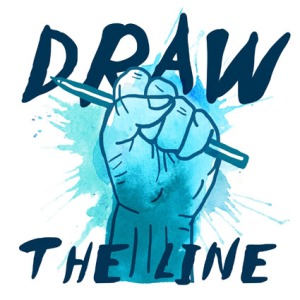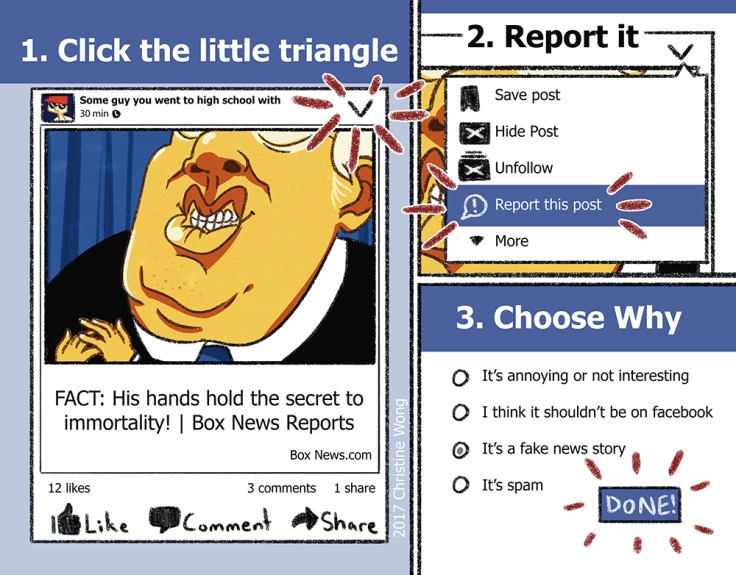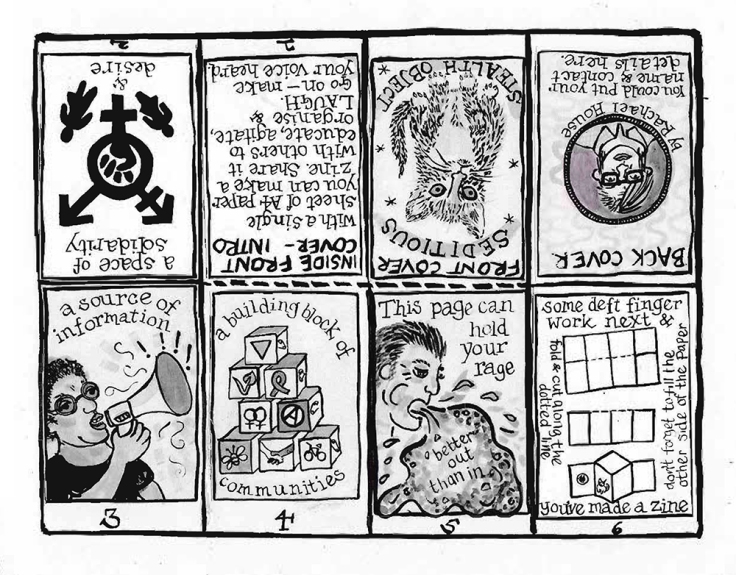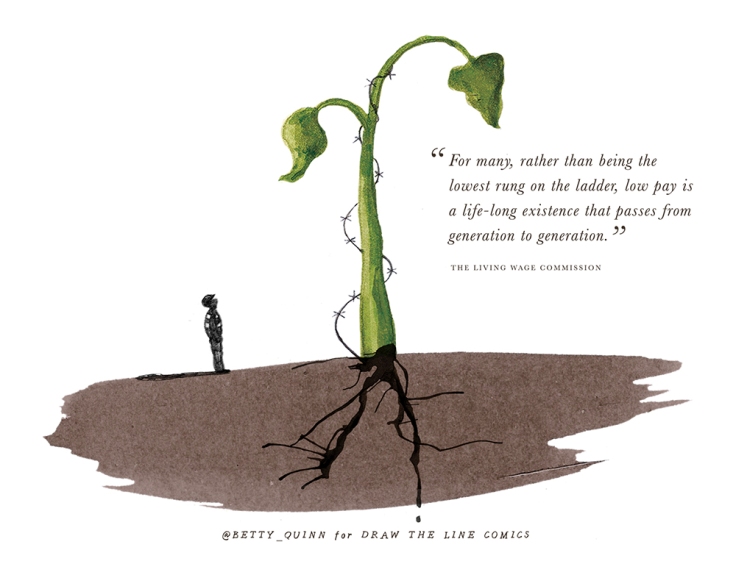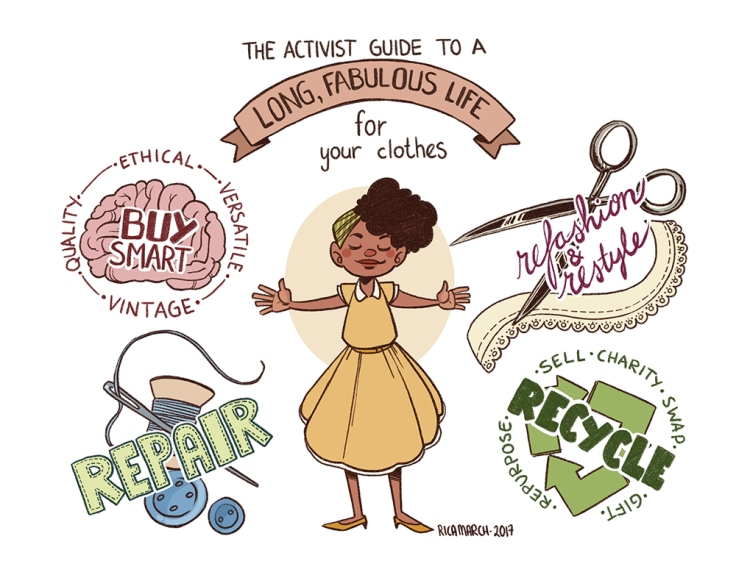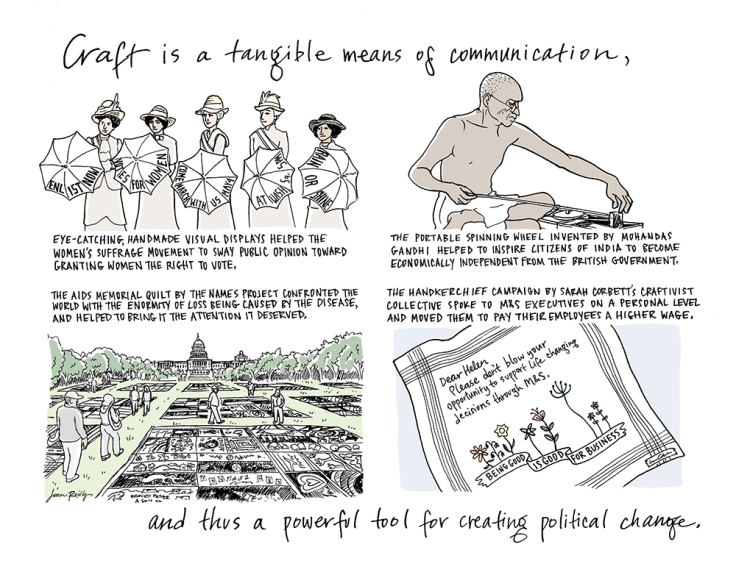The world view just swung heavily back to misogyny.
Whatever you’ve got between your legs, women are going to need some extra support right now.
Here are some steps you can take to support the sisterhood.
Click any of the images to see them at a larger size.
CLICK THE LITTLE TRIANGLE
If you see an ad or status on Facebook, and it spreads hate, lies or misinformation, look for the small triangle (usually top right) which will enable you to report it. Same on lots of other social media sites.
In the short term it will notify the site that the ad needs reviewing — but it may have an aggregate effect, too. If everyone did this, those advertisers would begin to be shunned by social media platforms and businesses who have an interest in keeping their users happy.
Image by Christine Wong
RECLAIM THE NIGHT
As many women will tell you, it can be scary walking alone at night, and for good reason. But everyone should feel free to walk where they want, when they want.
Take Back the Night marches, which see hundreds or even thousands of women join forces to march through parks, industrial estates and other places they feel unsafe, send that message loud and clear.
Men can take part by planning and attending support vigils for survivors of violence against women.
Image by Beata Sosnowska
CALL OUT
Sites like Human Rights Watch’s “Call It Out”, Everyday Sexism, Bye Felipe and For Exposure use the simple but effective strategy of collecting real-life instances of bad behaviour (in these cases, hate crimes, sexism and non-payment of artists) and publicising them to the world via a website and Twitter account.
By sharing the incidents you witness, you’re contributing to a public database that holds the nation to account.
Also, it’s pretty simple to copy this model for any other areas of injustice, and set up your own website. One we’ve heard about recently is Beer Sexism, collecting examples of women-unfriendly behaviour in the world of microbreweries.
Image by Apila Pepita Miettinen
PUT UP A UNITED FRONT
Women have made massive strides in the workplace, but discrimination and inequality is still a daily reality of work for many women.
After being repeatedly talked over and ignored, female staffers in the White House came up with a plan to make their voices heard in a male-dominated office. When any one of them gave their views in meetings or emails, the other women would back them up by repeating that view themselves, overcoming the muffling effect of male dominance.
Image by Woodrow Phoenix
DIVERSIFY YOUR BOOKCASE
Seek out and read stories, books and comics created marginalised people. Recommend them to others. It’s a win-win: not only are you increasing your knowledge about a different world view, but you’re supporting the authors too.
Image by Amanda Priebe
WALK THE STREETS
It’s really easy to organise a march or a demonstration these days, thanks to social media. So, get everyone out on the streets and let’s shout about injustice.
Image by Simon Russell
REFUSE TO SHUT UP
If you’ve been angry six times this week, the next outrage might just start to feel a bit samey – but we’ve got to keep shouting.
You might lose a few Twitter followers, friends might begin to yawn… some things are more important.
Image by Richard Tingley
STAY ANGRY
If your anger is justified, don’t let others shut you down by telling you it’s ill-mannered to contradict their views. That’s just a diversionary tactic. Stay angry.
Image by Jeroen Janssen
PUT THE PRESSURE ON
Tell your MP or other representative what you expect them to do about the issues that matter to you. And keep telling them.
You might get a pat, generic response: that’s not good enough, and you should write back to tell them so. Otherwise, how will they know? It’s our job to hold our representatives to account.
Image by Simon Russell
SAY IT OUT LOUD
When the political narrative directly turns against your beliefs, your race, your sexuality or your lifestyle, it’s frightening.
Do you know someone who may be reading the news and feeling that fear right now? Let them know you’ve got their back. You’d be surprised how much a few words can do.
Image by Josie Pearse
RESEARCH YOUR GOOD INTENTIONS
Read up on how people prefer to be supported. Your assumptions may not be quite right.
Image by Richy K. Chandler
SPEND WISELY
Read up on the places where you spend your money: do they pay their workers a living wage? Do they support sweatshops or child labour? Do they fund the weapons industry or finance a political party that you disagree with?
Many apps and websites can help you. Shopping with local independent businesses can also help you avoid many of the big, bad brands.
Image by Emmi Bat
KICK IT OLD-SCHOOL
Got access to a photocopier or printer? Make a zine, then hand it out at a gig or political meeting. Whee, it’s just like the 80s all over again.
Image by Rachael House
CRANK UP THE SINGER
If you’re handy with a sewing machine, making your own clothes means that you can opt out of the multinational fashion business, which often exploits workers, ships garments half way round the world, and dictates how women should look.
Fashion-loving blogger Ivy Arch set herself a challenge to stay away from clothes shops for a year, in 2013, and never went back. As a result, she’s now got one of the most personal and eclectic wardrobes you’ve ever seen.
Image by Jacqueline Nicholls
MAKE A NOISE
Campaign, march, demonstrate, use non-violent direct action. Take heart from those who have taken this route before, and who have made change — through history, like Martin Luther King, and in recent times, like the Feminist Library campaign in London.
Image by Una
REPRESENT EVERYONE
If you’re an artist who includes characters in their work (from cartoonist to scriptwriter to designer), make sure that you depict all kinds of people.
By showing characters who are disabled, non-heteronormative, from religious or ethnic minority backgrounds and so on, you can play a huge part in the public’s perception that all types of people as unremarkable or sympathetic.
Image by Kripa Joshi
PAY WELL
Fair pay means giving employees a wage that covers a basic standard of living with some extra to account for unexpected costs or to go towards building a more secure future.
The Living Wage Foundation say: “In low paid sectors a vicious cycle of high levels of staff turnover and absenteeism can drive problems of operational inefficiency, low standards and weak productivity that hit the bottom line.”
If you employ staff, consider joining companies like Brewdog and Oliver Bonas which pay the real living wage. You’ll bring a piece of mind to your workforce. You’ll nurture happier, more engaged workers who’ll stick around. And you’ll reflect fair values back into your business
Image by Beth Dawson
GO SLOW
Fast fashion — the phenomenon of cheap highstreet shops churning out clothes that are only designed to last a season, cost almost nothing, and then end up in landfill — is bad for the environment.
“Clothes are the second largest source of pollution after oil,” according to the US organisation Opposing Views.
It’s very likely also bad for the people who make the clothes. Ask yourself how much the factory workers must be being paid, to be able to offer garments at such low prices. Then research the more ethical options and take your custom there.
Buy fewer items that are high quality and will last longer.
Image by Rica March
STAND UP
People like you don’t stand for election, right? That’s exactly why you should consider it.
When government is dominated by the rich, the privileged, the male, or other dominant groups, legislation tends to favour those people. We owe it to our own communities to represent them in local and national politics.
Image by Rosa Devine
LEAVE A DEPOSIT
Shop dropping is the opposite of shop-lifting: instead of taking from a store, you leave something.
Slip a note into a jacket pocket, pin a badge onto a lapel, or leave a drawing between the pages of a book: a political message for a future shopper to find.
Works particularly well for spreading the word on issues like sweatshop conditions, the living wage, and undesirable business connections.
![]() This action may contravene the law in some jurisdictions: proceed with caution.
This action may contravene the law in some jurisdictions: proceed with caution.
Image by Kate Charlesworth
CRAFT YOUR PROTEST
Sarah Corbett found traditional methods of protest to be aggressive, loud and unkind – so she embraced Craftivism, a gentler form of protest.
Her project to give embroidered handkerchiefs to the Marks and Spencers board worked: it brought about a change in policy that saw a higher-than Living Wage being introduced for the department stores’ workers.
Craftivism encourages contemplation, community and critical thinking — and anyone can do it.
Image by Joan Reilly
 All artwork on this page is licensed under a Creative Commons Attribution-NonCommercial-ShareAlike 4.0 International License.
All artwork on this page is licensed under a Creative Commons Attribution-NonCommercial-ShareAlike 4.0 International License.
CRANK UP THE SINGER
If you’re handy with a sewing machine, making your own clothes means that you can opt out of the multinational fashion business, which often exploits workers, ships garments half way round the world, and dictates how women should look.
Fashion-loving blogger Ivy Arch set herself a challenge to stay away from clothes shops for a year, in 2013, and never went back. As a result, she’s now got one of the most personal and eclectic wardrobes you’ve ever seen.
Image by Jacqueline Nicholls
REPRESENT EVERYONE
If you’re an artist who includes characters in their work (from cartoonist to scriptwriter to designer), make sure that you depict all kinds of people.
By showing characters who are disabled, non-heteronormative, from religious or ethnic minority backgrounds and so on, you can play a huge part in the public’s perception that all types of people as unremarkable or sympathetic.
Image by Kripa Joshi
GO SLOW
Fast fashion — the phenomenon of cheap highstreet shops churning out clothes that are only designed to last a season, cost almost nothing, and then end up in landfill — is bad for the environment.
“Clothes are the second largest source of pollution after oil,” according to the US organisation Opposing Views.
It’s very likely also bad for the people who make the clothes. Ask yourself how much the factory workers must be being paid, to be able to offer garments at such low prices. Then research the more ethical options and take your custom there.
Buy fewer items that are high quality and will last longer.
Image by Rica March
